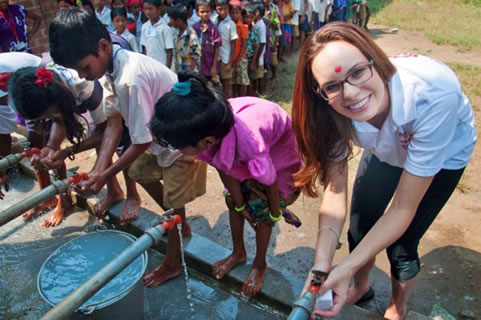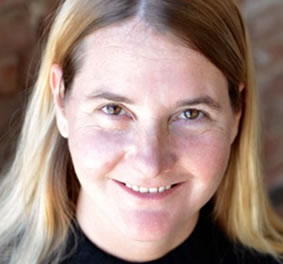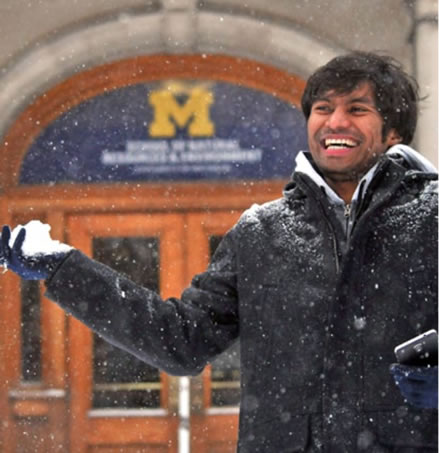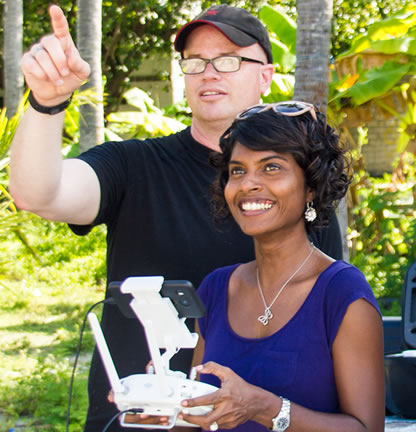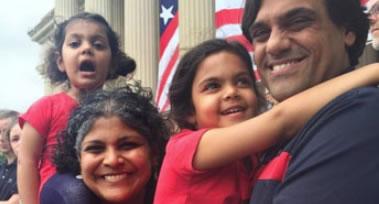|
|
"Make sure that you're curating people in your life that will have your back and want you to succeed. Being an entrepreneur is the loneliest task, but also the most rewarding."
Erin Zaikis (BA '10), founder, Sundara — While working in rural Thailand, Erin Zaikis noticed that migrant children were attending schools without soap. After further research, she found that the problem wasn't lack of supply, but lack of distribution. In 2013, Zaikis founded Sundara, a social enterprise that trains women in Myanmar, India, and Uganda to source and recycle used soap from hotels, then distributes their soap to schools and clinics. Sundara's model is both ecologically and financially sustainable, and uses creative means like street plays to teach about hygiene.
|
|
"It's never too early to get feedback from users. If you have product-market fit—which comes from a strong understanding of what users want— everything else is easier."
Rose Afriyie (MPP '11), co-founder, mRelief — Born in Harlem and raised in public housing, Rose Afriyie "carries the memory of what it's like to navigate the social services system," as well as the belief that safety net programs are integral to improving economic security for lowincome families. mRelief, an easy to-use web and text system, helps low-income Americans quickly find out if they qualify for food stamps, then connects them to the easiest application method.
|
|
"Entrepreneurs rarely get it right the first time. It is important to be adaptive. Also, being coachable and knowing how to effectively engage with mentors is key."
Kelly Ramirez (MPP/MUP '98), CEO, Social Enterprise Greenhouse — Kelly Ramirez is passionate about supporting social enterprises with the tools—including technical assistance, low-interest loans, financial management services, and more—they need to grow. For entrepreneurs seeking to start a new venture, she says, "It's important to follow your passion, because getting a new venture off the ground requires a crazy level of commitment." Based in Providence, Rhode Island, Social Enterprise (SE) Greenhouse supports for-profit and not-for-profit enterprises tackling pressing social challenges such as food access, affordable housing, and education.
|
|
"Learn about as many big and wicked problems as you can and challenge your views by making diverse, interdisciplinary, and motivated friends. After you spot the problem that moves you, the rest are details."
Adithya Dahagama (MPP/MS '16), co-founder, Cheruvu — With support from U-M's Dow Sustainability program, Adithya Dahagama co-founded Cheruvu to provide data-driven decision-making support for small farmers in India. Last year, Cheruvu worked with 250 farmers in two villages; this year, Cheruvu is working with 3,600 farmers in 54. Cheruvu provides site-specific nutrient management advice and weekly weather forecasts to each participating farmer. The goal: to build resilient and sustainable villages by informing the decisions of small farmers.
|
|
"Building a strong team is essential. New organizations are fundamentally risky, and funders will respond to founders who have assembled a solid team."
Andrew Schroeder (MPP '07), co-founder, WeRobotics — By day, Andrew Schroeder is the director of research and analysis for the NGO Direct Relief. But he is also the co-founder of WeRobotics, a non-profit social enterprise that uses robotics for social good. WeRobotics helps local partners use robots— including drones, unmanned terrestrial vehicles, and more— to implement humanitarian aid, global health, and environmental protection projects in developing economies. After a natural disaster or conflict, drones can distribute medicine or collect information from places that are more challenging or dangerous for humans to reach.
|
|
"Whether you're a for-profit or non-profit, don't treat corporate partners like ATMs. Make sure it's structured as a win-win for all sides."
Bulbul Gupta (MPP '04), social innovation advisor — Bulbul Gupta is a consultant who helps social enterprises and investors design strategies for growth. As an advisor to the Clinton campaign, she also focused on ways the campaign could infuse social innovation, innovative finance, and entrepreneurship into its business agenda. To succeed as an independent consultant, Gupta says, "Be putting things together that no one else is, bring innovative and fresh ideas, and network constantly."
By Afton Branche for State & Hill, the magazine of the Gerald R. Ford School of Public Policy
Below is a formatted version of this article from State & Hill, the magazine of the Ford School. View the entire Fall 2016 State & Hill here.

